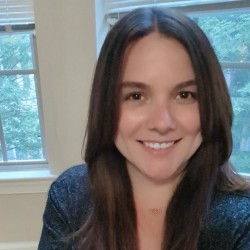Jamie Higgins (Intern Therapist)
Jamie Higgins is doing her graduate school internship at The Center for Growth: June 2, 2025 - June 2, 2026.
Therapy is more than a space to process pain; it’s an invitation to imagine something new. Whether you’re navigating anxiety, grief, self-doubt, or simply longing for deeper connection, I aim to co-create a space with you that feels steady, spacious, and real. As an intern therapist at The Center for Growth, I hold a deep reverence for what it means to share emotional truth and to be witnessed without judgment. I believe therapy should honor your resilience while gently exploring the parts of you that are asking for more. More understanding, more alignment, more ease.
Many of the clients I work with arrive feeling overwhelmed, stuck, or unsure how to move forward. Some come to therapy with clear concerns: persistent worry, sadness, stress, or emotional disconnection. Others are harder to categorize. People who look like they’re functioning well on the outside, but privately feel numb, unfulfilled, or lonely. Some clients sense they’re outgrowing a version of themselves, or feel ready to confront patterns that no longer serve them. Therapy offers a space to sort through all of it. Not to label or fix, but to witness, understand, and choose with greater intention.
In session, I bring a calm, grounded presence and a genuine interest in your story. I believe that insight and change emerge when we feel emotionally safe and deeply heard. My style is collaborative and thoughtful, with space for both reflection and practical tools. Sometimes that means sitting with a difficult emotion and gently staying with it; sometimes it means exploring the origins of a belief or behavior. I work at a pace that respects your nervous system and your readiness. Above all, I want therapy to feel like a place where all parts of you are welcome, especially the ones you’ve learned to hide.
I draw from multiple clinical frameworks in my work, including psychodynamic therapy, cognitive behavioral therapy (CBT), narrative therapy, and mindfulness-based approaches. Psychodynamic exploration helps us understand how your early experiences and relational history inform your current emotional life. CBT offers tools to challenge unhelpful thought patterns and shift behaviors that may be keeping you stuck. Narrative therapy invites you to reexamine the story you’ve inherited about yourself and ask what version you want to tell now. And mindfulness supports awareness, learning to notice what’s happening inside without judgment. These modalities are tools, not rules. What matters most is how we tailor them to you.
I’m particularly interested in helping clients explore their inner dialogue and relational patterns. Whether you find yourself caught in self-criticism, struggling to set boundaries, or feeling emotionally reactive in relationships, we’ll work together to understand what’s behind those responses. Often, these patterns served an important purpose at one point. They helped you survive, stay connected, or avoid conflict. Therapy allows us to pause, get curious, and ask: Are these strategies still serving you? If not, what might it look like to try something new?
Before becoming a therapist, I spent over a decade working in the technology and telecommunications industry, where I led teams, managed operations, and supported clients through high-stakes problem-solving. That experience gave me a front-row seat to the many ways stress, burnout, and identity concerns manifest in daily life, especially for people who feel responsible for keeping everything together. It also taught me how often we perform “okay,” or even excel, while privately struggling. I bring that awareness into therapy. If you're someone who feels like you're constantly pushing forward but not sure why it still feels empty or disconnected, you're not alone, and you don’t have to figure it out alone.
I also bring a deep appreciation for the power of human connection. Through both academic training and lived experience, I’ve explored the healing potential of relational spaces. While group therapy was one of the first places I saw this healing happen in real time, those same principles shape my one-on-one work. I’ve learned that growth often unfolds not in isolation, but through relational repair; in moments of being witnessed, emotionally held, and safely challenged. Therapy, at its best, mirrors that experience. We co-create a relationship where vulnerability becomes less frightening and more freeing, where trust builds slowly but meaningfully, and where change feels possible.
In our work together, you might encounter parts of yourself you didn’t expect: protective parts, fearful parts, hopeful parts. I see these as deeply intelligent aspects of your system, often formed in response to pain or rupture. Rather than judge or “fix” them, I’ll invite us to understand them. I’ll also honor the endings, transitions, and losses that arise in therapy, whether that’s letting go of a relationship, an identity, or a version of yourself that no longer fits. I’ve reflected often on the emotional weight of endings, and I approach them with the same care I bring to beginnings.
I strive to offer therapy that is culturally responsive and attuned to systemic realities. As a white, cisgender, able-bodied woman, I bring awareness of my own identity into the room and actively seek to create a space where all clients feel seen, respected, and supported. I work with individuals across a wide range of identities, including LGBTQ+ clients, people of color, neurodiverse clients, and those navigating cross-cultural or intergenerational challenges. I understand that therapy does not happen in a vacuum, and I’m always holding in mind the cultural, structural, and relational forces that may be shaping your experience.
Outside of my clinical training, I serve as a Graduate Assistant at Chestnut Hill College, where I support students, faculty, and program development in the Clinical and Counseling Psychology department. I contribute to projects centered around accreditation, curriculum integration, and justice-informed training and educational initiatives. These experiences enhance my ability to think systemically and maintain an ethic of reflection and growth in both academic and clinical settings.
On a personal note, I live in Philadelphia with my dog, Lovely, who keeps me grounded in joy and curiosity. I find peace in nature, delight in trying new restaurants, and value travel for the perspective it brings. These parts of my life remind me that healing isn’t just about insight. It’s also about connection, creativity, and reimagining what it means to be fully alive.
Starting therapy is an act of courage. It asks you to pause, turn inward, and invest in your own well-being, sometimes for the first time in a long time. Whether you’re in crisis, in transition, or simply curious about what’s possible, I would be honored to walk with you.
Licensure:
- Pennsylvania: Currently in Graduate School, Working Under Supervision
- New Jersey: Currently in Graduate School, Working Under Supervision










